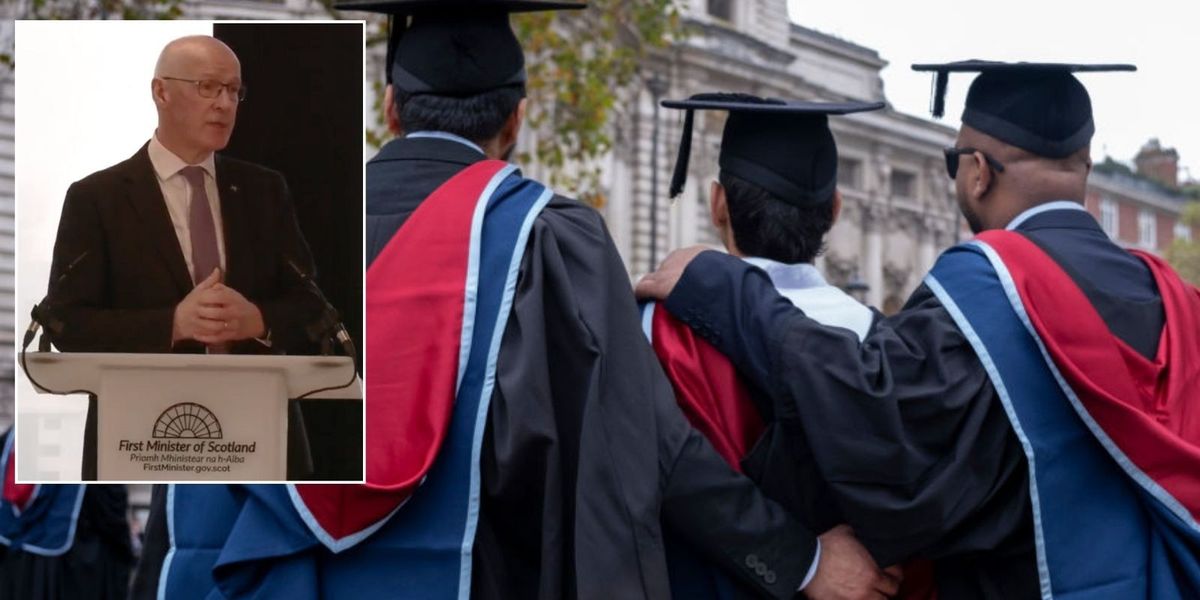International students who graduate in Scotland could be offered dedicated visas to encourage them to stay in Scotland beyond their studies, if the UK Government agrees to cooperate.
Scottish First Minister John Swinney unveiled the proposal during a speech focussed on opportunities for economic growth in front of a room full of business leaders and representatives from Higher Education at JP Morgan Chase in Glasgow.
He signalled three key focuses for his government in harnessing Scotland’s energy potential, growing the population and forming closer relationships with the European Union.
Flanked by recent graduates starting out their careers at JP Morgan Chase, the First Minister recognised the need for “urgent action, clarity of purpose and collective endeavour”.
International students who graduate in Scotland could be offered dedicated visas to encourage them to stay in Scotland beyond their studies, if the UK Government agrees to cooperate
Getty/ GB News
He said: “Maximising the economic and community benefit from our massive energy wealth, acting now to address our looming population crisis and committing ourselves once again to Europe and its single market is essential for the wellbeing of our society and the future success of the economy.”
To tackle Scotland’s chequered past of graduate retention, the ‘Scottish Graduate Visa’ would be linked to a Scottish tax code and be based on a requirement to work and live in Scotland.
The two-year visa is designed to give international graduates two more years of skilled work within their areas of expertise, acting as a bridge before to gain the necessary experience to apply for a Skilled Worker Visa.
Migration is not a devolved issue and is therefore reserved to Westminster, so Swinney has called on the UK Government to cooperate.
In 2005, the UK and Scottish Labour governments introduced the ‘Fresh Talent: Working in Scotland’ scheme – another post-graduate visa route for international students that was replaced by a UK wide scheme before being stopped in 2012.
Eluding to Scotland’s growing concern over an ageing population, Swinney said: “We need a new focus on an immigration policy that works for Scotland.
“We need people to come here, to live and work to bolster our working age population.
“We need them to address skill shortages and to increase our productivity and our innovation.
“They’re welcome for who they are, for the contribution they will make to our land, their distinct perspective, their hopes and their ambitions, but have no doubt, they are essential for tax revenues and sustainability of our public services like our National Health Service and the future successes of your businesses, as paid employees or paying customers.”
With regards to setting his Government’s sights on closer ties with the EU, the First Minister said that his aim wasn’t to look backwards and reopen the Brexit debate, but to strengthen ties with the bloc.
“Simply put, ‘Remain’ was the past; ‘Rejoin’ is Scotland’s best hope for a more prosperous future,” he said.
He hopes to move towards a veterinary agreement with the EU to lower the barriers to trade for Scottish produce.
In March 2024, the Scottish Government announced exports of Scottish fruit and meat to the EU fell by 59 per cent and 29 per cent respectively, compared to the equivalent period in 2020.
Secretary of State for Scotland, Ian Murray, has already prioritised the advancement of ‘Brand Scotland’ within his remit, placing his drive for Scottish produce within close proximity to the First Minister.
Scottish First Minister John Swinney unveiled the proposal during a speech focussed on opportunities for economic growth in front of a room full of business leaders and representatives from Higher Education at JP Morgan Chase in Glasgow
GB News
However, given Keir Starmer’s repeated commitment to “make Brexit work” for Britain, ambitions of rejoining the EU are unlikely to spread south any time soon.
Answering questions from the media and business representatives, Mr Swinney was inevitably quizzed on the President Trump resuming office and what they could mean for Scotland.
“I’ve made no secret of the fact that I am alert to the danger of tariffs and the damage that could do to the Scottish whisky industry,” he said.
“There is absolutely no alternative but for me to engage with the US Administration led by President Trump, should those circumstances arise.”
President Trump’s first term saw a 25% tariff fall on Scotch whisky imports during the last 18 months of his tenure, estimated by the Scotch Whisky Association to have cost the industry £600 million.
Should such a tariff be placed on more one of Scotland’s most profitable exports to the United States, it would surely put a star-spangled spanner in the First Minister’s economic ambitions.

